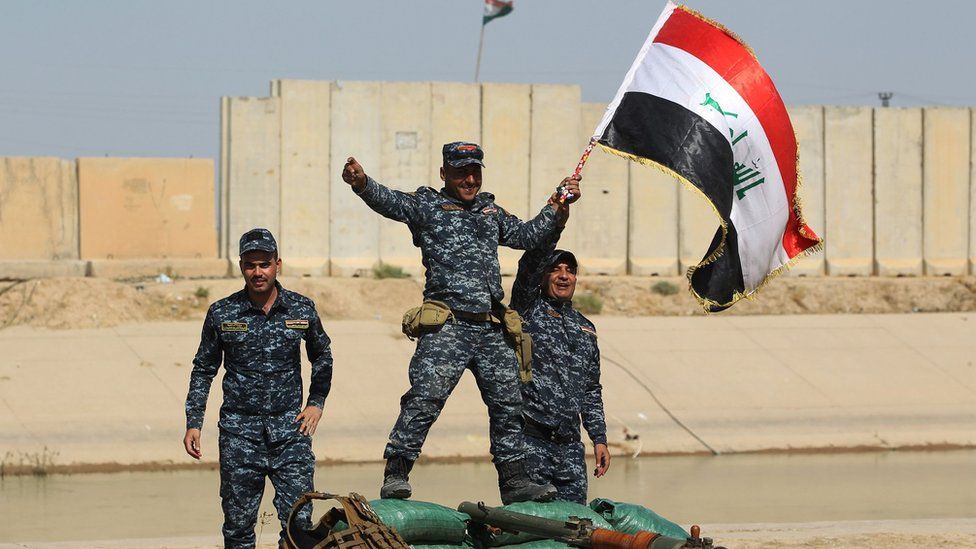Iraq conflict: Kurdish leaders refuse to reject referendum result
- Published

Kurdish leaders have refused Iraqi government demands to reject the result of an independence referendum ahead of talks on the future of Iraqi Kurdistan.
They met Iraqi President Fuad Masum on Sunday in a bid to reduce spiralling tensions following the vote, which the central government called illegal.
Iraqi troops and allied militia are facing off with Kurdish fighters near the disputed city of Kirkuk.
However, Kurdish leaders say they want "to reach peaceful resolution".
They reject the "military option" but are "ready to defend" the city against outside forces, said Hemin Hawrami, an aide for Kurdish leader Massoud Barzani.
Iraq's central government had demanded they reject the result of the referendum, held in three autonomous provinces of Iraqi Kurdistan, but also in nearby Kurdish-held areas including Kirkuk, before beginning talks.
The government also denied setting a deadline for Kurdish fighters to withdraw from key sites in Kirkuk, which has now passed.
The Iraqi parliament asked Prime Minister Haider al-Abadi to send troops to Kirkuk and other disputed areas after the official referendum results - which overwhelmingly backed independence - were proclaimed.
The province, which bears the same name as the city, is thought to have a Kurdish majority, but Kirkuk has large Arab and Turkmen populations.
On Saturday, there was a brief outbreak of fighting near Kirkuk, with each side blaming the other, reports the BBC's Orla Guerin in Iraq.
In an attempt to stop tensions spiralling further still, President Masum, himself a Kurd, met with leaders from the Kurdistan Democratic Party (KDP) and Patriotic Union of Kurdistan (PUK) in Dukan on Sunday.
After it finished, Mr Hawrami sent a series of tweets, one of which said: "Good news on reiterating our national unity in the face of all pressure."
However, he also said Kurdish political leaders were not prepared to accept any preconditions before sitting down to negotiate with Baghdad.
Allow Twitter content?
This article contains content provided by Twitter. We ask for your permission before anything is loaded, as they may be using cookies and other technologies. You may want to read Twitter’s cookie policy, external and privacy policy, external before accepting. To view this content choose ‘accept and continue’.
The oil-rich Kirkuk province is claimed by both the Kurds and Baghdad, though the two sides were recently united in the fight against the Islamic State (IS) jihadist group.
Kurdish Peshmerga forces took control of much of the province in 2014, when IS militants swept across northern Iraq and the army collapsed.
- Published13 October 2017
- Published11 October 2017
- Published27 September 2017
- Published18 September 2017
- Published15 October 2019
- Published25 April 2018